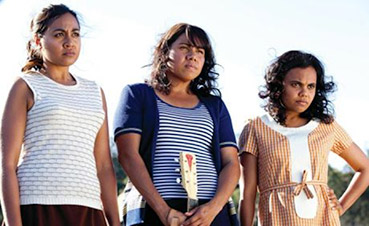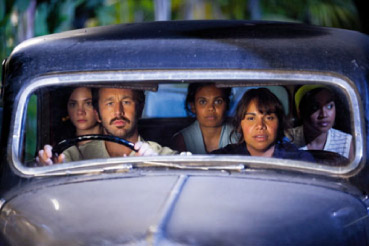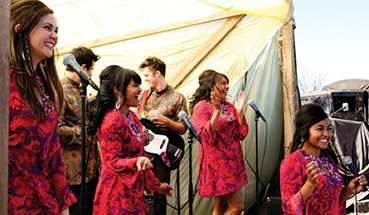|
Ask any self-serious film critic which oft-banded promotional phrases make them curdle and don't be surprised if they answer with "based on a true story" or "feel-good hit of the year" (you might as well slap "dramatically inauthentic" and "blatantly manipulative" on the poster while you're at it). Both apply to Wayne Blair's debut The Sapphires, a musical biopic unashamed in its desire to have you dancing in the aisles – just ask Vanessa Feltz, who shimmied her way out of the press screening I attended.
This combined with my natural aversion to musicals, British comedians on the big screen and sequins didn't bode well, but The Sapphires is that rare film that satisfyingly does exactly what it says on the tin. As a rapturous harmony of laughs, tears and song, it's absolutely irresistible.
Any pre-screening reservations were immediately put to rest as the film opened with Creedence Clearwater Revival's uniquely recognizable harmonica squeal from "Run Through the Jungle", so familiar now from countless viewings of that classic moment in The Big Lebowski at its most hilariously absurd, when an Uzi-strapped Walter Sobchak rolls out of the Dude's car at high speed determined to "take that hill" with pitifully disastrous consequences. In a period context, it sets the scene for a celebration of Motown soul with a side order of boozing, brawling, down under rock 'n' roll.

In 1958, a quartet of unknown, outta nowhere aboriginal soul sisters are belting out Gospel tunes with the presence and power of a whole choir. Ten years later, their warm, enveloping voices are burnished with the sorrow of country and western music, now comprising the set list for their backwater bar live shows. Country clearly isn't for everyone and the girls are going nowhere in their attempts to win over Outback racist audiences booing them off stage. Doing a good job of taking it in their stride and spitting it back at them, all the sass in the world won't change the fact that the townspeople are colour blind to the group's God-given gifts.
Enter Dave (Chris O'Dowd), a comically poignant and resourceful drunk, whose beery hangdog expression and five o' clock shadow exudes goodwill. An unsteady-on-his-feet underdog, sweating boozy charm, O'Dowd is an instantly rootable class clown, all the while subtly pointing to sadness behind the laughter. When we first meet him, he's his own punch line, a failed cruise ship entertainer whose quips elicit belly laughs yet are wearily delivered. His passion for soul music re-awakened by these four born to it, the girls quickly come to embody all the musical aspirations he was certain had left him behind.
It's a first class turn from O'Dowd, capitalizing on his rising celebrity in a role tailor made for the Golden Globes, forever making a song and dance out of this type of broad musical comedy, routinely shut out by the Academy.

More importantly, it's the first time I've remotely warmed to the Irish shlub, perpetually recalling the boy picked last for team sports. He is of course star of the awkwardly un-funny The IT Crowd, or as I call it, "That cult show with Richard Ayoade not half as good as the other two truly cult shows, starring Richard Ayoade", Garth Marenghi's Darkplace and Man to Man with Dean Learner. Last year, no amount of unbecoming facial hair could hide the fact that O'Dowd's face was far too contemporary and doughy for the Victorian era ravishings of The Crimson Petal and the White. Let us not forget the featured role in Bridesmaids (which broke him stateside) as an extraneous subplot from an entirely different film, nor his call-attention-to-itself transatlanticism in Friends With Kids (an altogether vulgar ensemble doing none of its stars any favours) and the less said about his Golden Raspberry-ready American accent in HBO's Girls the better. Like Ewan McGregor, he seems like a lovely guy, great to have a pint and a chat with, it's just impossible to overlook the poor choice of roles and severely limited range as an actor...
...Or so I thought. O'Dowd not only nabs all the best lines and completely steals every scene he's in, he sings as if he's auditioning for The Commitments and gives the best white man impersonation of James Brown I've ever seen. Never going for easy laughs, he plays heartache in perfect tandem with the humour. Though his contribution to the film will no doubt be remembered for its uproarious comedy, there's no mistaking the work of an accomplished actor here.
Whipping them into showbiz shape, Dave's first job as manager is getting the girls to ditch the depressing country twang ("Ninety percent of music that is recorded is shite, the other ten percent is soul") and after a feather-ruffling shuffle of personnel which sees natural leader Gail demoted from lead singer in favour of diva supreme Julie's superior pipes, they're off to Vietnam to perform for the troops.
During many a montage, hard lessons about life on the road are learned and inter-group rivalries soon rear their ugly heads, though part of the film's special joy is seeing how any and every dispute can be settled in song. With each dramatic turn the film steadily makes its way through a stack of Motown hits, from William "Smokey" Robinson's "Who's Lovin' You" or "I'll Take You There", originally made famous by the Staple Sisters. Led by Australian Idol runner-up Jessica Mauboy as Julie, the performers more than do them justice with assuredly blazing renditions which don't fall prey to excessive whoops and vocal falsettos, common to modern pop singers making a melismatic mess of a classic.

Such old school reverence really pays off in the moment where Gail finally gets to sing lead, coming just as her personal life has hit an all time low – one scene in which she reads a tragic love letter is nothing short of devastating. Finding release in the music and understanding that the show must go on for the sake of her sisters, she sings out of her skin without warbling, the tears rolling down her face providing all the necessary emotional wallop. Deborah Mailman is an actress as fierce as her character, playing Gail as an exasperatingly overprotective mouth on legs. Defensive of her bandmates as a mama bear is with her baby cubs, she's more than a match for sharp-tongued Dave, as the two continue to butt heads before falling for one another. It's an inevitability that every audience member will spot right away but nevertheless, you'll find yourself willing Dave and Gail to get together every step of their telegraphed romance.
This is one of many dramatic elements reviewers have taken issue with, the consensus being that when the film comes off stage it becomes laboured, its socio-historical observations hackneyed and over-reaching. The skipped-over issue of racism is admittedly little more than a scene setter for the music, and yet the horrors of the Vietnam war come across as just that; briefly but brilliantly depicted with superbly choreographed, perfectly timed action, worthy of Saving Private Ryan's second unit. That the battle sequences are this hard-hitting in a film that frankly doesn't need to be, is a surprise that bursts the glamour bubble, reminding us that these people are risking their lives whilst out on tour. A reality unfathomable to musicians today, the film's period speaks to the power of music which makes the world a better place at the worst of times.
Life-affirming, soul-swelling cinema worth every superlative that advertisers can throw at it, when I call The Sapphires a don't-miss, hand-clapping, feet-stomping good time, far from feeding the publicity machine, I'm simply stating the facts.
|